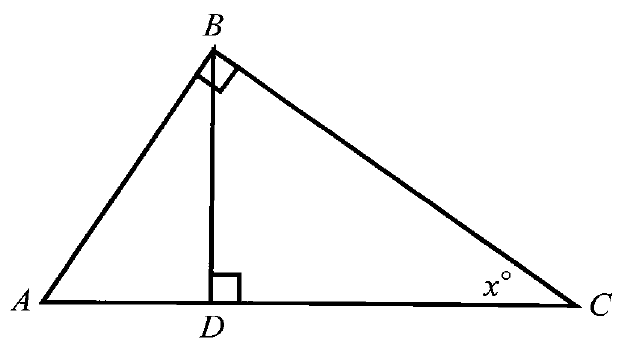TRIGONOMETRIC RATIOS EXAMPLES AND SOLUTIONS
Example problems and solutions given in this section will be much useful for the students who would like to practice problems on trigonometric ratios.
Before look at the example problems, if you would like to know the basic stuff on trigonometric ratios,
Example 1 :
Compare the sine, the cosine, and the tangent ratios for ∠A in each triangle below.
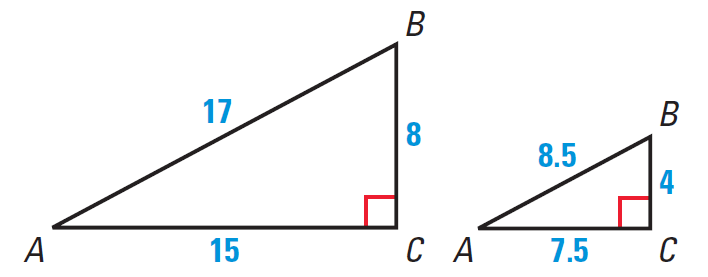
Solution :
By the SSS Similarity Theorem, the triangles are similar. Their corresponding sides are in proportion, which implies that the trigonometric ratios for ∠A in each triangle are the same.
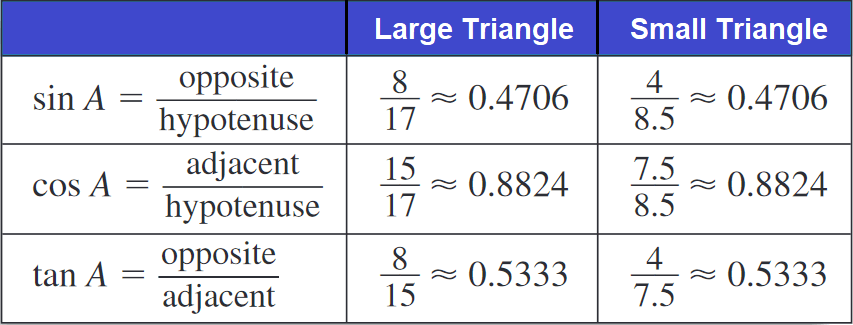
Trigonometric ratios are frequently expressed as decimal approximations.
Example 2 :
Find the sine, the cosine, and the tangent of the indicated angle.
a. ∠S b. ∠R
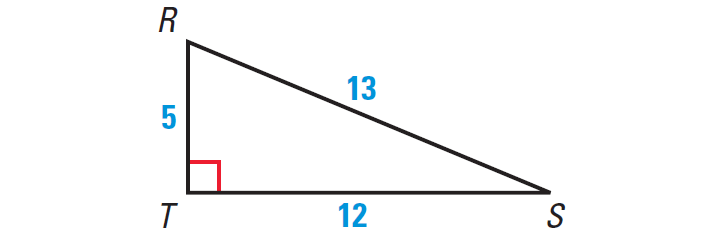
Solution (a) :
The length of the hypotenuse is 13. For ∠S, the length of the opposite side is 5, and the length of the adjacent side is 12.

sin S = opp./hyp. = 5/13 ≈ 0.3846
cos S = adj./hyp. = 12/13 ≈ 0.9231
tan S = opp./adj. = 5/12 ≈ 0.4167
Solution (b) :
The length of the hypotenuse is 13. For ∠R, the length of the opposite side is 12, and the length of the adjacent side is 5.

sin R = opp./hyp. = 12/13 ≈ 0.9231
cos R = adj./hyp. = 5/13 ≈ 0.3846
tan R = opp./adj. = 12/5 ≈ 2.4
Example 3 :
Find the sine, the cosine, and the tangent of 45°.
Solution :
Begin by sketching a 45°-45°-90° triangle. Because all such triangles are similar, we can make calculations simple by choosing 1 as the length of each leg. From the Pythagorean Theorem, it follows that the length of the hypotenuse is √2.

sin 45° = opp./hyp. = 1/√2 = √2/2 ≈ 0.7071
cos 45° = adj./hyp. = 1/√2 = √2/2 ≈ 0.7071
tan 45° = opp./adj. = 1/1 = 1
Example 4 :
Find the sine, the cosine, and the tangent of 30°.
Solution :
Begin by sketching a 30°-60°-90° triangle. To make the calculations simple, we can choose 1 as the length of the shorter leg. From 30°-60°-90° Triangle theorem, it follows that the length of the longer leg is √3 and the hypotenuse is 2.
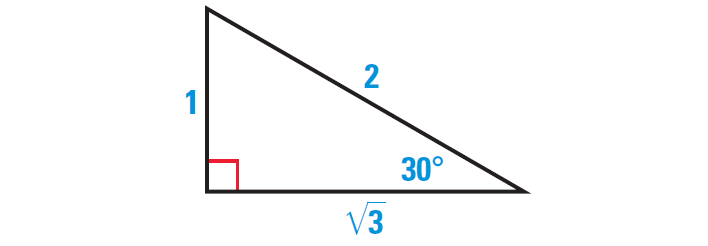
sin 30° = opp./hyp. = 1/2 = 0.5
cos 30° = adj./hyp. = √3/2 ≈ 0.8660
tan 30° = opp./adj. = 1/√3 = √3/3 ≈ 0.5774
Example 5 :
Jacob is measuring the height of a Sitka spruce tree in North Carolina. He stands 45 feet from the base of the tree. He measures the angle of elevation from a point on the ground to the top of the tree to be 59°. How can he estimate the height of the tree ?
Solution :
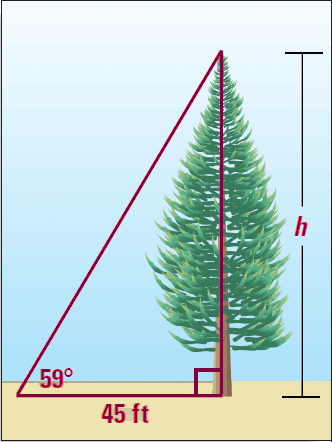
To estimate the height of the tree, Jacob can write a trigonometric ratio that involves the height h and the known length of 45 feet.
In the above right triangle, for the angle 59°, h is opposite side and the side has length 45 ft is adjacent side.
The trigonometric ratio that involves opposite side and adjacent side is tangent.
Write ratio :
tan 59° = opp./adj.
Substitute.
tan 59° = h/45
Multiply each side by 45.
45 ⋅ tan 59° = h
Use calculator or table to find the value of tan 59° and substitute.
45 ⋅ 1.6643 = h
Simplify.
74.9 ≈ h
So, the tree is about 75 feet tall.
Example 6 :
The escalator at the University Metro Rail Station near University of Miami in Coral Gables, Florida rises 76 feet at a 30° angle as shown in the diagram below. Find the distance d a person travels on the escalator stairs.

Solution :
To find the distance d a person travels on the escalator stairs, we can write a trigonometric ratio that involves the side has length d and the known length of 76 feet.
In the above right triangle, for the angle 30°, d is hypotenuse and the side has length 76 feet is opposite side.
The trigonometric ratio that involves opposite side and hypotenuse is sin.
Write ratio :
sin 30° = opp./hyp.
Substitute.
sin 30° = 76/d
Multiply each side by d.
d ⋅ sin 30° = 76
Substitute 0.5 for sin 30°.
d ⋅ 0.5 = 76
Divide each side by 0.5
d = 76/0.5
d = 152
So, the person travels 152 feet on the escalator stairs.
Kindly mail your feedback to v4formath@gmail.com
We always appreciate your feedback.
©All rights reserved. onlinemath4all.com
Recent Articles
-
Digital SAT Math Problems and Solutions (Part - 144)
Apr 14, 25 07:27 PM
Digital SAT Math Problems and Solutions (Part - 144) -
Quadratic Equation Problems with Solutions (Part - 1)
Apr 14, 25 11:33 AM
Quadratic Equation Problems with Solutions (Part - 1) -
Quadratic Equation Problems with Solutions (Part - 2)
Apr 14, 25 11:22 AM
Quadratic Equation Problems with Solutions (Part - 2)
